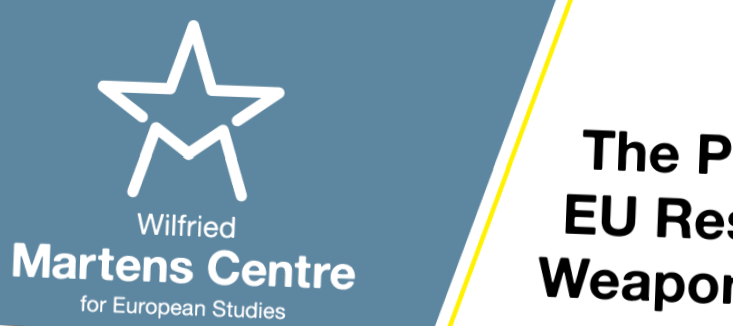(14 February, 2024 – Martens Centre)
DISCUSSANTS
- Christina Chen, Research Fellow, Institute for National Defence and Security Research, Taiwan
- Theresa Fallon, Founder and Director, Centre for Russia Europe Asia Studies, Belgium
- Shairee Malhotra, Associate Fellow, Observer Research Foundation, India
- Andreas Schwab, Member of European Parliament, Germany
MODERATOR
- Tomi Huhtanen, Executive Director, Martens Centre
This conference, organized by the Martens Centre, aims to provide an overview of the dynamics of global cooperation. The world is clearly shifting from a state of order to disorder, questioning fundamental and global concepts. Western powers are facing the imperative to adapt to this dynamic evolution.
India’s strategic vision amidst global shifts
In terms of Indian foreign policy, two main practices guide India’s current strategic vision: the practice of strategic autonomy, present since its independence, and the doctrine of multi-alignment, an evolution of India’s non-alignment policy after the Cold War. This doctrine aims to engage India in multiple multilateral forums and to utilize diversified global partnerships to promote its own national interests. The distinction between non-alignment and multi-alignment lies in the fact that the latter conveys a much stronger sense of participation and engagement, while non-alignment was a more reactive policy. Thus, India is now a part of several groupings and multilateral formats, maintaining close ties with a wide range of nations. This strategy stems from India’s current status as a middle power in the international system, aspiring to a multipolar world that will offer it more options to maximize its gains. Minister Jaishankar’s statement explains this approach well: “This is a time for us to engage America, manage China, cultivate Europe, reassure Russia, bring Japan into play, draw neighbors in, extend the neighborhood and expand traditional constituencies of support.”
Tensions in China-Taiwan relations
Since Xi Jinping assumed power in 2012, China has progressively escalated its assertiveness towards Taiwan, with ambitions to extend the Taiwan Strait and to reshape the global order. This shift has been evident through rapid military modernization and actions perceived as aggressive rather than assertive. Regarding Taiwan, Chinese provocations extend beyond military exercises, with two notable drills occurring first in 2022, following Pelosi’s visit to Taiwan, culminating in China’s largest military exercise to date. Christina Chen, Research Fellow, Institute for National Defence and Security Research in Taiwan explained that China’s actions also include threats of naval blockade and hybrid warfare tactics involving disinformation campaigns, and cyberattacks. Additionally, China is expanding its influence in the South China Sea by constructing artificial islands and threatening Filipino fishermen.
The reunification of Taiwan remains a central project for Xi Jinping, even though the lack of military assurances necessary to execute this. There is no clear timeline for a potential Chinese invasion of Taiwan, nevertheless, Xi Jinping continues to aggressively expand Chinese military capabilities with the ultimate goal of making the reunification of Taiwan his political legacy. The international community must remain vigilant in light of this development and understand that China’s assurances do not guarantee an absence of long-term threats to Taiwan.
China-Russia dynamics: A shifting landscape
The evolving dynamics between China and Russia are currently a subject of significant interest and scrutiny. According to Theresa Fallon, a recent development is the interaction between Russia and North Korea, exemplified by Putin’s meeting with Kim Jong Un. This meeting occurred amidst South Korea’s decision to send more armaments to Ukraine than all EU member states combined, while North Korea, in turn, began supplying armaments to Russia. Although China denies having influence in North Korea, the resulting chaos benefits its strategic interests. This scenario has given rise to a new geopolitical triangle involving North Korea, China, and Russia, indicating shifting alliances and strategic interests in the region. Despite this, Japan and South Korea maintain strong relations, presenting a separate dynamic in the broader East Asian context. For Beijing, establishing and maintaining a relationship with Moscow remains a top priority, reflecting the strategic importance of collaboration between the two nations. China’s decision to engage with Russia underscores a strategic calculus aimed at ensuring Russian cooperation rather than allowing it to become an adversarial force. As such, the relationship between China and Russia continues to evolve, with implications for global geopolitics and regional stability.
Europe’s economic position
During his speech, Andreas Schwab, Member of European Parliament shed light on the shifting dynamics of power on the global stage and the implications for the European Union. In response to new economic challenges due to globalization, the EU faces the imperative to de-risk its economy. Balancing the imperative of maintaining a robust economy with the growing concerns over environmental sustainability, particularly evident in initiatives such as the green deal, presents a key challenge for European policymakers.

